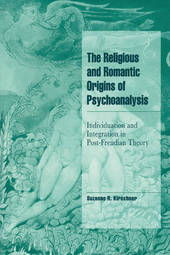
|
The Religious and Romantic Origins of Psychoanalysis: Individuation and Integration in Post-Freudian Theory
Paperback / softback
Main Details
| Title |
The Religious and Romantic Origins of Psychoanalysis: Individuation and Integration in Post-Freudian Theory
|
| Authors and Contributors |
By (author) Suzanne R. Kirschner
|
| Series | Cambridge Cultural Social Studies |
|---|
| Physical Properties |
| Format:Paperback / softback | | Pages:254 | | Dimensions(mm): Height 229,Width 152 |
|
| ISBN/Barcode |
9780521555609
|
| Classifications | Dewey:150.195 |
|---|
| Audience | | Professional & Vocational | |
|---|
| Illustrations |
Worked examples or Exercises
|
|
Publishing Details |
| Publisher |
Cambridge University Press
|
| Imprint |
Cambridge University Press
|
| Publication Date |
23 February 1996 |
| Publication Country |
United Kingdom
|
Description
In this book, Suzanne Kirschner traces the origins of contemporary psychoanalysis back to the foundations of Judaeo-Christian culture, and challenges the prevailing view that modern theories of the self mark a radical break with religious and cultural tradition. Instead, she argues, they offer an account of human development which has its beginnings in biblical theology and neoplatonic mysticism. Drawing on a wide range of religious, literary, philosophical and anthropological sources, Dr Kirschner demonstrates that current Anglo-American psychoanalytic theories are but the latest version of a narrative that has been progressively secularized over the course of nearly two millennia. She displays a deep understanding of psychoanalytic theories, while at the same time raising provocative questions about their status as knowledge and as science.
Reviews"...Kirschner makes an important and original contribution to the literature on religion, modernity, and contemporary psychoanalysis." Religious Studies Review "A truly illuminating work. Through careful and sophisticated historical analysis, Kirschner entirely recasts our understanding of contemporary developmental theory, revealing the suppressed and very significant subtext." Kenneth J. Gergen, Swarthmore College "A fascinating and ground-breaking book. Kirschner makes clear how the developmental narrative of psychoanalysis owes as much to our biblical and Romantic traditions as to observations from consulting room and nursery. She also makes us wonder about the stand alone truth of these observations and the extent to which they have been unwittingly infiltrated by Western cultural values. Could it be that its many links to the Zeitgeist help to explain the enduring popularity of psychoanalysis?" Donald P. Spence, Professor of Psychiatry, Robert Wood Johnson Medical School, New Jersey "In the tradition of Philip Rieff's Triumph of the Therapeutic, Kirschner shows how current trends in psychoanalysis are rooted in the wider cultural context. But where Rieff emphasized the discontinuities between traditional and modern views of the therapeutic, Kirschner brings to light the deep continuities in our interpretation of life's aims. This remarkable book will be of value not just to professionals in the field, but to anyone who cares about the quest for the good life in our world." Charles Guignon, Professor of Philosophy, University of Vermont "Kirschner brilliantly traces the origins of the psychoanalytic story of development to its Biblical origins." R. Shilkret, Choice "Kirschner's presentation reflects broad scholarship in history, literature, psychology and religion...Kirschner makes contemporary psychoanalytic theory accessible in a new and powerful way--for its practitioners, as well as for those who stand outside the discipline." E. James Lieberman, Bulletin of the History of Medicine
|